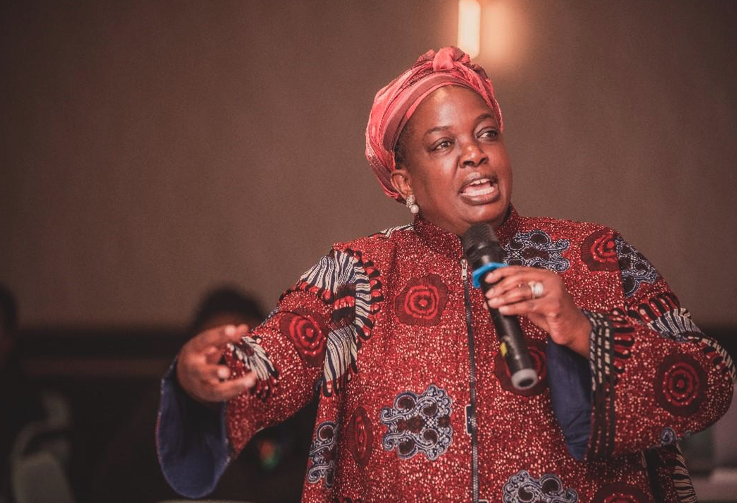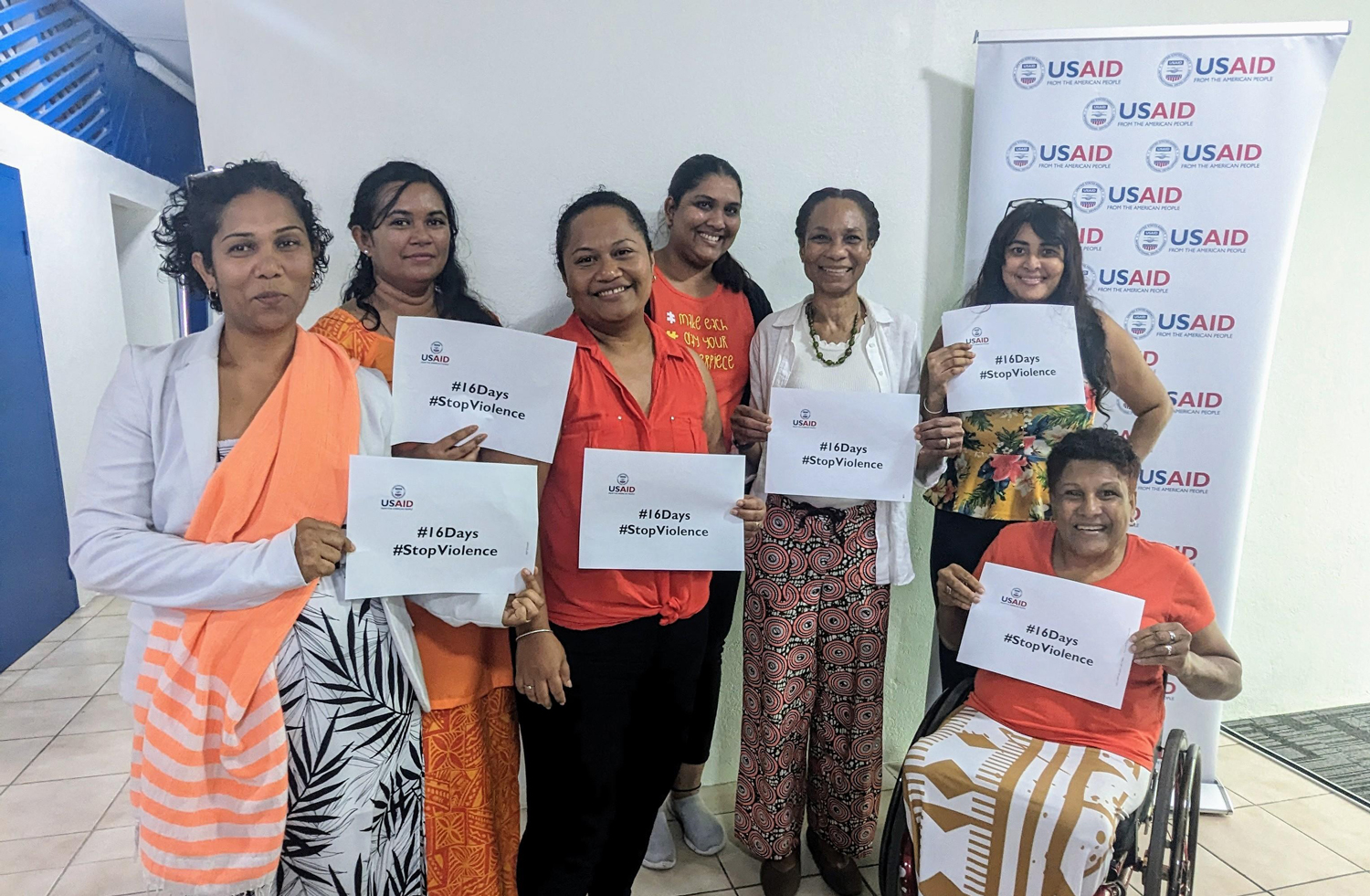International Women's Day 2024
Designing Intersectional and Gender Transformative Programming
We are committed to making a lasting impact in every community we serve. A vital part of this commitment is integrating Gender Equality and Social Inclusion (GESI), ensuring fairness, opportunity, and dignity for all.
By prioritizing GESI, Cadmus helps clients enhance access to goods and services, especially benefiting women, girls, marginalized communities, and economically disadvantages groups. Our work spans broader areas such as financial inclusion, trade facilitation, export promotion, fostering improved legal and regulatory environments,
We are proud to make a difference around the world.
Promoting GESI Tax Policy in Zambia

Participant at the GESI Tax Conference on December 15, 2022, organized by the USAID Zambia Revenue for Growth Project.
Gender Equality and Social Inclusion (GESI) is critical to basic human rights as well as to sustainable growth and development. In 2021, Zambia ranked 138th in the UN Gender Inequality Index, a composite metric that looks at inequality in achievements between genders in three dimensions: reproductive health, empowerment, and the labor market. This ranking underscores Zambia’s challenges in fostering inclusivity and gender parity, emphasizing an often-overlooked connection between GESI and taxation.
Cadmus recognizes the differential impact of tax laws on various groups, including men, women, and marginalized communities. Through the USAID Revenue for Growth Project, Cadmus is supporting the Government of the Republic of Zambia in initiatives to ensure that reforms to tax policies and administration practices consider the impact on gender and marginalized groups, thus extending GESI activities beyond traditional areas to also encompass taxation.
In Zambia, Cadmus is raising awareness of the important link between GESI and taxation by conducting training and workshops with key government and non-government stakeholders to emphasize the importance of integrating GESI considerations into fiscal analyses, generating gender-disaggregated data that is crucial for evaluating the impact of tax policies, and designing equitable and inclusive taxation frameworks. These engagements demonstrate our commitment to integrating GESI considerations into fiscal policies to benefit all Zambians.

“Tax policy plays a crucial role in advancing Gender Equality and Social Inclusion by not only mobilizing revenues to support marginalized groups, particularly women and girls, but also by ensuring that the tax system through redistribution, avoids unintentionally imposing burdens on these vulnerable populations.”
Dr. Agatha Siwale-Mulenga
Public Private Dialogue Lead, USAID Revenue for Growth
Fostering Inclusive Digital Evolution in the Pacific

The Digital Connectivity and Cybersecurity Partnership team, in Suva, Fiji.
As digital technologies become increasingly integral to global economic well-being, how can we guarantee this digital evolution is constructed on technology characterized by openness and security? How can it encourage inclusive economic development, and empower every individual, particularly those most vulnerable?
In the Pacific, women and girls face several challenges in the Information and Communication Technologies (ICT) field. From limited access to education and training opportunities, resources constraints, to cultural norms and gender stereotypes that discourage their involvement, there is a notable underrepresentation of women in leadership roles within the ICT industry, which restricts their chances for career progression and influence in the field.
Recognizing the challenges women and girls face in ICT, and through USAID Digital Connectivity and Cybersecurity Partnership-Pacific, Cadmus is emphasizing the integration of GESI principles while developing a resilient digital ecosystem in the Pacific region. By partnering with regional and national entities, DCCP is adopting a proactive stance to broaden internet accessibility and cybersecurity, democratize digital literacy, and foster inclusivity and resilience to build a digitally empowered Pacific community.

“With intentional investing, we can overcome the barriers that women and girls face in digital connectivity and cybersecurity space. DCCP aims to provide access to meaningful connectivity, digital skills and literacy, mentoring and networking, and highlighting successful stories of women and girls—especially women and girls with disabilities in the tech industry.”
Anju Mangal
Chief of Party, USAID Digital Connectivity and Cybersecurity Partnership
Championing Inclusivity
Cadmus is supporting the initiatives of the U.S. Department of Labor, particularly through its collaboration with the Partnership on Employment and Accessible Technology (PEAT) and the Partnership on Inclusive Apprenticeship (PIA).
Under the umbrella of these partnerships, Cadmus is dedicated to advancing inclusive practices within the workforce, particularly for marginalized groups such as people with disabilities and women facing intersectional challenges. PEAT focuses on fostering collaborations to create inclusive workplaces, while PIA concentrates on expanding apprenticeship opportunities to embrace underserved and underrepresented populations. Through research, webinars, and innovative toolkits, Cadmus, alongside the Department of Labor, is committed to driving positive change in employment practices across various sectors, ensuring equal access and opportunities for all.

“There are so many ways that technology can be a benefit or a barrier in the workplace. By centering the voices and experiences of people with disabilities and intersecting identities, we can begin to remove roadblocks and take advantage of the benefits. As a woman with visible and non-apparent disabilities, I am extremely proud to do this work.”
Lex Huth
Associate, Public Sector Division, Strategy & Transformation

Integrating Gender Strategies for Economic Growth
Leveraging extensive experience and in-house gender expertise, Cadmus applies contextualized strategies to maximize gender equality impact across our programs. We utilize gender analysis tools such as the Gender Assessment Checklist and Methodology to systematically incorporate gender and social inclusion considerations into market systems, legal frameworks, and regulatory practices. We integrate gender equality approaches into broader economic analysis, such as the Digital Ecosystem Country Assessments (DECA) and the Systems Analytical Framework for the Digital Economy (SAF-DE) to deliver impactful and equitable results for women and underrepresented groups.
We design such platforms as APEC’s Women and the Economy Dashboard to aggregate and promote gender-disaggregated data for equitable policymaking. At the project level, we create gender-sensitive monitoring, evaluation, and learning frameworks. Our training programs equip women entrepreneurs, policymakers, and civil society actors with market-driven skills, while our global networks create strategic linkages.
Cadmus also leads research to understand the differing impacts of infrastructure investments on women and other disadvantaged groups. We advocate for both women-focused and gender-integrated approaches to ensure investments in better infrastructure and expanded training opportunities yield equitable and universal benefits.